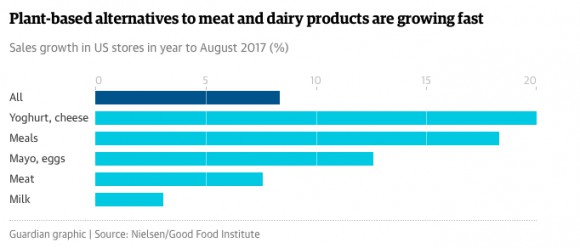Meet GFI Innovation Specialist Aylon Steinhart!

GFI Business Innovation Specialist Aylon Steinhart travels nationwide to inspire the next generation of innovators, speaking with students at top business schools about opportunities in the plant-based and clean meat market sectors. When he’s not on the road (and often when he is), Aylon works with good-food entrepreneurs to share his expertise in business development, marketing, and go-to-market strategy, supporting the success of early-stage startups. Prior to joining the GFI team, Aylon co-founded two startups and has worked with major food companies such as Kellogg’s, Applebee’s, and Nestle.
Originally from Kohav Ya’ir, Israel, Aylon spent his teenage years in the San Francisco Bay Area, eventually graduating cum laude from UC Berkeley’s Haas School of Business.
Between trips, Aylon took some time to share his story and his thoughts on the path forward for high-impact food innovation.
Without further ado, please enjoy my conversation with GFI’s Aylon Steinhart!

What interests you about a market-based approach to big problems? Have you always pursued entrepreneurial endeavors?
Growing up in “the startup nation” and then moving to Silicon Valley, entrepreneurship has always had a big presence in my life. The son of two entrepreneurs, my interest in business started about as early as my interest in protecting the planet, which both came along at a young age. When I was seven years old, I went door-to-door in my small town collecting donations for Israel’s nature protection fund. When I was eleven, I started a skateboard company with a group of friends and we even secured some “seed funding” from an enthusiastic dad. Like many of the greatest business lessons, both of these projects were failures from a monetary perspective. But they were the beginning of an important lesson on how both business and advocacy can change people’s’ behavior.
After launching two (non-food) startups yourself, why have you decided to focus your entrepreneurial efforts on solving problems in the food industry?
If running a consumer-tech business has taught me anything (and I’m still hoping it has!) it’s that if you want people to do something, you need to make it as easy as possible for them to do it. This approach is fundamental to modern product design, but it also applies to behavioral change. That is, if you want someone to change their behavior, you have to make that change incredibly easy.
Looking at the food industry from the outside, for me the question was never if we need behavioral change (it’s clear that we do, very badly), it was how we can achieve this change. Specifically, given that consumption of industrial animal products causes more climate change than all of transportation combined, pushes countless people further into poverty and starvation, and causes the life-long suffering of billions of animals in the U.S. alone, the question must be: How do we get people to consume less meat, dairy, and eggs?
Inspired by the meteoric growth of Impossible Foods, Beyond Meat, and similar innovators in the space, I quickly came to understand that the “simplest” way to get people to eat fewer animal products is to take a market-based approach. If we give people foods that taste better, are competitively priced, and are as accessible as their animal-based counterparts, then we can make eating more animal-free foods the easy thing to do, not just the right thing to do.

Give me your pitch: Why do you think food innovation is the next great business opportunity?
Let’s start with the market size: The U.S. market for meat is around a $220 billion. Globally, the demand for meat is expected to double by 2050. But while this market is huge, it faces a fundamental issue — it relies on animals. From a supply chain perspective, animals are a risky production platform for meat. Zoonotic epidemics like Avian Flu and Swine Flu, massive bacterial contaminations like E. Coli, and myriad other issues make relying on animals unideal for businesses, to say the least.
But what’s more is that even in perfect conditions, animals are still incredibly inefficient as a mechanism for converting plant calories to meat calories (their current function in the meat system). In fact, chickens, which are amongst the most efficient animals, require nine calories of food to produce every one calorie of meat. That’s a staggering loss, and pigs and cows are even worse (around 15 and 25, respectively).
Simply improving these conversion ratios through innovation in the animal body is quite unlikely. We have to remember that these are real animals with real bodies, and they’ve already been pushed to the limits of their physiology. Chickens, for example, grow so fast (six times their natural rate) that their hearts, legs, and lungs often can’t support their bodies. Further manipulating animal bodies is an untenable solution, not to mention that it doesn’t address many of the other environmental and health concerns of conventional animal agriculture. So if you’re sticking with animals for creating meat, you’re stuck with vast resource loss.

But it’s this same inefficiency that opens up such a big opportunity for better solutions in the marketplace. Through food innovation we’re able to create products that directly compete with and replace animal-based products but don’t actually require animals. And if you are creating a product that is more efficient, less volatile, and has far fewer inputs (plant-based meat, for example, uses 96% less water and 74% less land than conventionally produced meat), then at scale you are going to have lower prices, higher margins, and — eventually — a significant market share of the $220B U.S. meat market.
In fact, according to Lux Research, alternative proteins are poised to claim 33% of the global protein market by 2054. And this is all happening through food innovation, notably in the burgeoning industries of plant-based and clean meat, dairy, and eggs.
Okay, so I’m convinced. Now what?
The first step to getting involved is understanding the technologies that are changing the game: plant-based meat and clean meat. GFI has put together two great documents to give an overview of where these technologies fit in the market and detailing the myriad opportunities they present. Those documents are the Plant-Based Meat Mind Map and the Clean Meat Mind Map. In addition, there’s plenty of additional media to study, including videos, podcasts, books, and more. GFI’s resource page is a good start.
After you understand the technologies and general opportunities, I really see three major paths forward to getting involved: starting your own company, joining one of the startups in the space, and joining a large food company.
- Starting Your Own Company: Plant-based meat makes up a fraction of one percent of the total meat market in the U.S. With that number expected to grow to 33% in the next few decades, we are talking about nearly $70B of market share up for grabs. The market is so far from saturated, and with investors ranging from Bill Gates and Richard Branson to Cargill and Tyson, this is absolutely the right place and right time to get involved. A good start would be to join GFI’s entrepreneur group, GFIdeas.

You might be concerned that you don’t have a background in food or biotech, but those are both things that can be either learned or hired for by a smart and ambitious entrepreneur. In fact, Ethan Brown, CEO of Beyond Meat, started his company with an MBA and a background in clean energy. Today Beyond Meat is one of the fastest growing plant-based meat companies out there. There are many similar stories about founders in this space. If you’re like me and these other entrepreneurs, you learn best by doing. There’s no better preparation for starting a company in this space, than, well, starting a company in this space. And there’s no better time to do it than now.
- Joining a startup in the space: If you’re not quite ready to start a company today, joining one of the startups in the space can give you valuable insight, experience, and opportunity for impact. Whether you are interested in plant based or clean meat, there are various startups doing exciting work that are seeking expertise in a broad range of fields. Check out GFI’s Jobs and Resources page for some positions and scroll to the bottom of the page for links to many of the companies in the space. Getting involved in GFIdeas might also help you to make useful connections.
- Joining a large food company: Working at a large food company would provide you with valuable knowledge and experience in the food space. With numerous big companies like Kraft-Heinz, Kellogg, and Tyson involved in plant-based or clean meat (or both), there are opportunities to support the adoption of these innovations within companies that have massive resources to quickly scale up production and distribution.

Thanks for the roadmap! Speaking of roadmaps, tell me more about your travels with GFI!
As part of my role, I do a lot of speaking at top universities and MBA programs. The goal is to inspire the next generation of entrepreneurs to start or join plant-based and clean meat startups. One of my favorite talks was one I gave at the Harvard Kennedy School.
When I walked into the room that I would be speaking in, I was surprised. It was less of a room and more of a small auditorium. Filling up this room would be no easy feat, but I trusted in the hosts.
As I was setting up for the talk it dawned on me that it was Friday, and that the talk was starting at 5pm. This wasn’t ideal — I was in direct competition with happy hour on a college campus! Not that I mind speaking to an intimate group, but I had invited a few VIPs from industry to come see the talk, and a big empty room is still an empty room. Then I learned of the worst news: This was in October, and I was competing with not just happy hour, but Oktoberfest. In fact, just two floors below where I was speaking, there was an event with free beer.
I was doomed.
But the students at Harvard are smart. So smart, in fact, that they knew the topic of plant-based and clean meat presented such incredible opportunities for business, for a meaningful career, and for our planet, that the talk was worth skipping free beer. The Beyond Burgers served at the talk might have helped too…
When 5pm rolled around, this small auditorium of a room was not empty — it was filled beyond capacity! The discussion was wonderful, and the company ideas brainstormed in that room could very well change the world. Prost!
I’m impressed! So when you’re not competing with Oktoberfest (and winning), what do you do for fun? And what are some of your favorite plant-based products?
I’m a big fan of the outdoors. Wilderness backpacking, rock climbing, biking, and finding hot springs to sit in are some of my favorite activities. I also enjoy cooking and have recently started culturing my own nut-based cheeses (thanks Miyoko!).
I love a bunch of the products out on the market but have a soft spot for the Beyond Burger, Miyoko’s Smoked VeganMozz, and Hampton Creek’s Just Scramble. It’s awesome that the future of food is so delicious!

Indeed it is. Thanks for the time and entrepreneurship tips, Aylon!
If you think you want to work with Aylon to support the success of good-food entrepreneurship, check out GFI’s open positions and apply, apply, apply!

